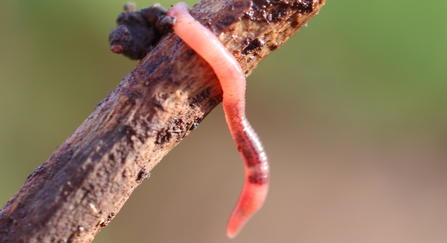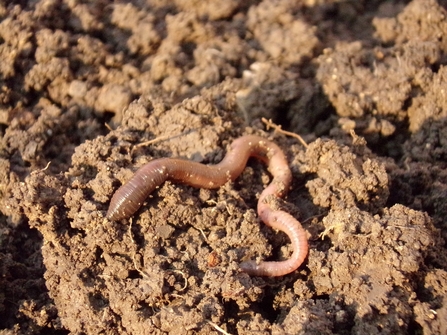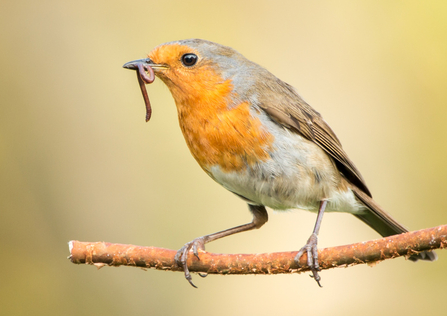So how do worms cope in wet soil? They certainly don’t like it too dry, but how wet is too wet? A worm has no lungs, but breathes through its skin. Oxygen from air or water passes directly from their outer cuticle into their blood vessels. Under normal conditions, soil contains both air and water, held in soil pores and worm burrows in fairly equal amounts. Oxygen diffuses easily from air, but about a thousand times slower from water, so in waterlogged soil worms move to the surface to breathe more easily. They can, however, survive for some time submerged in water.
Dr Cath’s Nature Notes – February 2023
Earthworms (c) Alan Price/Gatehouse Studio

Earthworm (c) Lauren Heather
At times of heavy flooding though, farmland can be inundated for some time, and soil quality can be disastrously affected. The sheer weight of water removes the air from the soil, and the unfortunate worms have no safe place to return to, even if they manage to survive in the water.
Rendered inactive by the much-reduced oxygen intake, they fall prey to the many creatures who consider half-drowned worm a tasty snack. Flooded fields bordering rivers are patrolled by fish, moving into the calmer water beyond the raging torrent in the main channel – imagine a barbel, feeling its way through the murky floodwaters, picking up worms as it travels.
A report published after flooding of the Somerset Levels in 2014 highlighted the complete disappearance of worms from some of the affected area and a radical decrease in worm numbers in other parts.

Earthworm
Worms are essential for good soil health, by aerating the soil to allow oxygen and water to move through it, and by eating organic matter, breaking it down and passing valuable nutrients back into the soil as worm casts (poop). These contain five times more key nutrients than ordinary surface soil and bacteria beneficial to plant growth.
A good population of worms can help to prevent flooding by creating sufficient burrows to allow surface water to drain through the soil, mitigating against soil erosion. Worms can even help to reduce pollution, cleaning up land contaminated with toxic heavy metals such as lead. A single acre of arable land, completely devoid of worms after heavy inundation, would require 24,000 new worms to restore it, but without them its productivity would be badly compromised.

Robin (c) Matthew Gould
They really are a keystone species, providing ‘ecosystem services’ vital to continuing life on earth, both for humans and for most other life forms. Darwin recognised this importance, long before the phrase had been coined, stating “It may be doubted whether there are many other animals which have played so important a part in the history of the world, as have these lowly organised creatures” in The Formation of Vegetable Mould through the Action of Worms (1881).
So spare a thought for the lowly worms, without which we would have less food, less soil, more pollution and more flooding. I love to imagine the scene of Charles Darwin scrutinising his flowerpots full of earthworms whilst his son played the bassoon to them, but even if you can’t manage quite that degree of enthusiasm, do what you can in your own patch to conserve them, and encourage organic and regenerative farming through your shopping choices. It could make all the difference.

